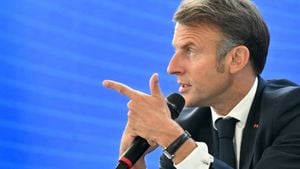Ukraine’s recent efforts to modernize its military procurement processes represent significant steps forward, especially as it pursues NATO membership amid the continuing conflict with Russia. The country’s newly established State Logistics Operator, known locally as DOT, aims to reshape how Ukraine acquires its defence materials, focusing primarily on nonlethal military goods such as food, clothing, and fuel. This innovative agency hopes not only to streamline procurement but also to tackle the longstanding issues of corruption which have plagued its military sector.
Founded under the auspices of the Defense Ministry, the DOT has made impressive strides within its first year. The agency's CEO, Arsen Zhumadilov, proudly reported to reporters from the Associated Press (AP): “We have contracted 95% of the products requested and managed to save 25% in costs.” Such statistics seem to be music to the ears of NATO officials who are watching Ukraine’s progress with cautious optimism, as they have long emphasized the need for transparency and efficiency within Ukraine's military operations.
One stark difference between the DOT and its predecessor agencies lies not just in its procurement strategies but also its organizational structure. With the introduction of a digital procurement platform known as DOT-Chain, this agency aims to revolutionize military purchases from order placement to invoicing, promising to reduce delivery times significantly. Preliminary functions of the platform have already been rolled out with planned expansions to other supply categories on the horizon. Given how technology-driven this approach is, it fits perfectly within the modern military framework Ukraine seeks to establish.
Despite these advancements, the path to NATO membership remains fraught with challenges, especially political ones. Several NATO member countries have voiced reluctance about extending membership to Ukraine, fearing it could exacerbate tensions with Russia. Plus, experts point out the pressing need for broader reforms within Ukraine’s military apparatus. The DOT is not without its critics; the traditional systems of military procurement still linger, creating resistance to fully embracing the innovations proposed by the new agency. Some skeptics within the Ministry of Defence are holding onto manual processes rather than transitioning to digital systems.
This urgent need for reform echoes the sentiments of Ukrainians who experienced the detrimental effects of previous corruption. Scandals under former Defense Minister Oleksii Reznikov involving inflated food contracts and inadequate supplies have resulted not only in significant financial losses but also left troops without adequate gear and resources during the harsh winters of conflict. President Volodymyr Zelenskyy’s administration has made it clear they want to shed this negative reputation and instead showcase transparency and efficiency.
While the DOT claims major achievements in procurement, the DOT has plans to extend its capabilities toward drone procurement soon, aiming to keep pace with modern warfare's rapid evolution. Military analysts suggest such advancements are necessary as drone technology becomes increasingly integral to combat strategies. Zhumadilov has asserted the importance of these projections, saying, “We understand how closely NATO, the G7, and member countries are observing our moves. They want to see if we can establish procurement systems resilient to inefficiencies and corruption.”
This initiatives demonstrate Ukraine's serious commitment to reform, but analysts caution against overreliance on agency-specific successes without addressing systemic issues within the broader Ministry of Defence. Disruption and rejuvenation may take time, but the agency's ability to garner international support and confidence is heavily reliant on its ability to combat graft and deliver tangible improvements across the board. Diplomatic relations alongside procurement reforms will be decisive for Ukraine. Securing alliances, especially with NATO, is more linked to effective governance and accountability than ever before.
A heavyweight stages like NATO will not simply allow membership based on military needs but will analyze the political intentions and reforms of potential candidates closely. Ukraine's ability to not only execute military reform but to operationalize transparency has massive ramifications on whether it will be inducted as NATO’s newest member. The stakes are high as the war grinds on: for both Kyiv and NATO's collective security, reform efforts within Ukraine must prove to be more than just strategic necessities.
Moving forward, Ukraine’s governmental commitment to fighting corruption and modernizing military procurement processes signifies potential new horizons for the country amid grave national challenges. Should these reforms mature as intended, it is likely to shift the tide favorably for Ukraine’s future—not just within NATO potential but also for its defense capabilities against the eastward aggression of Russia.



